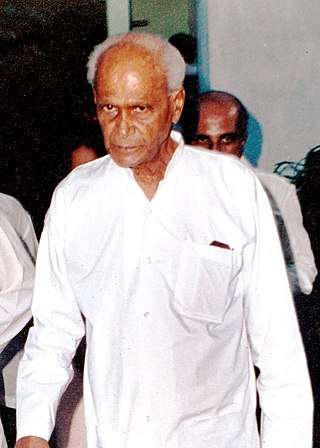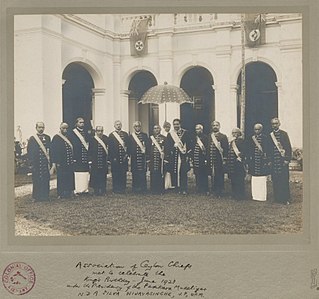Related Research Articles

Wijeyananda Dahanayake was a Sri Lankan politician. He was the Prime Minister of Ceylon from September 1959 to March 1960.

The Sri Lankan independence movement was a peaceful political movement which was aimed at achieving independence and self-rule for the country of Sri Lanka, then British Ceylon, from the British Empire. The switch of powers was generally known as peaceful transfer of power from the British administration to Ceylon representatives, a phrase that implies considerable continuity with a colonial era that lasted 400 years. It was initiated around the turn of the 20th century and led mostly by the educated middle class. It succeeded when, on 4 February 1948, Ceylon was granted independence as the Dominion of Ceylon. Dominion status within the British Commonwealth was retained for the next 24 years until 22 May 1972 when it became a republic and was renamed the Republic of Sri Lanka.

Edmund Peter Samarakkody was a Ceylonese lawyer, trade unionist, politician and Member of Parliament.

Mudaliyar was a Ceylonese colonial title during Portuguese and British rule of the island. Stemming from the native headman system, the title was usually hereditary, made to wealthy influential families loyal to the British Crown.

Dr. Cristopher William Wijekoon Kannangara was a Sri Lankan Lawyer and a politician. He rose up the ranks of Sri Lanka's movement for independence in the early part of the 20th century. As a lawyer he defended the detainees that were imprisoned during the Riots of 1915, many of whom were the emerging leaders of the independence movement. In 1931, he became the President of Ceylon National Congress, the forerunner to the United National Party. Later, he became the first Minister of Education in the State Council of Ceylon, and was instrumental in introducing extensive reforms to the country's education system that opened up education to children from all levels of society.

Edward Walter Perera was a Ceylonese barrister, politician and freedom fighter. He was known as the "Lion of Kotte" and was a prominent figure in the Sri Lankan independence movement, served as an elected member of the Legislative Council of Ceylon and the State Council of Ceylon.
Sir Henry Lawson De Mel, was a Ceylonese industrialist, lawyer, philanthropist and politician. He was a member of the Legislative Council and founder of the H.L. De Mel & Co.
The fourth election to the Legislative Council of Ceylon was held in 1924.

George Edmund de Silva was a Ceylonese lawyer and politician. He was the first Cabinet Minister of Industries, Industrial Research and Fisheries in independent Sri Lanka (1947–1948), a Member of Parliament and State Council.

Wilmot Arthur de Silva was Ceylonese veterinary surgeon, politician and philanthropist. He was the Minister of Health (1936–1942) in the second State Council of Ceylon and a former President of the Ceylon National Congress.

Henry Woodward Amarasuriya was a Ceylonese plantation owner, politician, educationist and philanthropist. He was the Cabinet Minister for Trade and Commerce in the cabinet of D. S. Senanayake. A former member of the Ceylon state council, H. W. Amarasuriya was a founding member and the first general secretary of the United National Party. He also held the position of Deputy Speaker and Chairman of Committees in the first parliament of Ceylon. A member of the first Education Executive Committee of the state council and a former general manager of the Buddhist schools, he did a great service to improve the education in Ceylon.
Ceylonese recipients of British titles conferred on the advice of Her Majesty's Ceylon Ministers. This list includes all those who were born in, worked in or lived in Ceylon.

The 1st State Council of Ceylon was a meeting of the State Council of Ceylon, with the membership determined by the results of the 1931 state council election held between 13 and 20 June 1931. The parliament met for the first time on 7 July 1931 and was dissolved on 7 December 1935.
The Maha Mudaliyar was a colonial title and office in Ceylon. Head Mudaliyar functioned as the head of the low country native headmen and native aide-de-camp to the Governor of Ceylon.
Don Christopher Wijesinghe Kannangara was a prominent landowner and Ceylonese politician.
Edwin Wilfred Abeygunasekera was a member of the 1st and 2nd State Councils of Ceylon.
Herbert Rayner Freeman was an English born Ceylonese public servant and politician.
Gate Mudaliyar Alexander Edmund de Silva Wijegooneratne Samaraweera Rajapakse OBE was a Ceylonese colonial-era politician and headman.
Galappatti Kankanange William Perera was a Ceylonese lawyer, educator, politician and diplomat.
References
- ↑ "Hon. Wickramanayake, Vincent Stuart de Silva, M.P." Directory of Past Members. Parliament of Sri Lanka. Archived from the original on 15 February 2023. Retrieved 28 May 2019.
- ↑ The Ceylon Blue Book. Government Printer, South Africa. 1935. p. 133.
- ↑ Wijesinghe, Sam (26 September 1999). "DP: A man who was one with the people". Sunday Times . Archived from the original on 8 May 2019. Retrieved 27 May 2019.
- 1 2 3 Wijesinghe, Sam (25 December 2005). "People and State Power". The Sunday Observer . Archived from the original on 28 March 2019. Retrieved 27 May 2019.
- ↑ Roberts, Nora (1993). Galle as Quiet as Asleep. p. 339. ISBN 9789559557906.